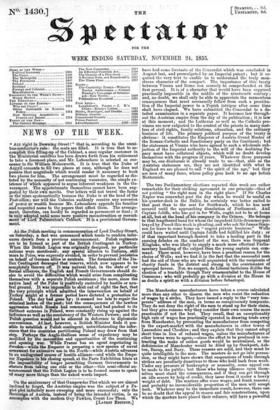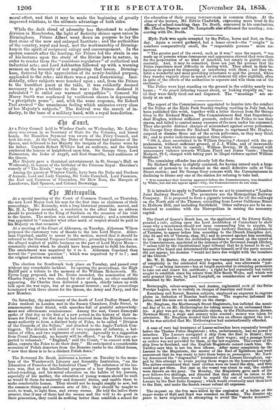The Manchester manufacturers have taken a course oaloulated more than
any other to disarm the men who resist the reduction of wages by a strike. They have issued a reply to the "very tem- perate" address of the men, in terms as conspicuously temperate. They do not deny the right of the men to stand up for their claim, but they give reasons why they consider their own course the more prao. ticable if not the best. They recall, that an exceptionably high rate of wages has practically operated in drawing trade away from Manchester, by preventing the manufacturer from competing in the export-market with the manufacturers in other towns of Lancashire and Cheshire ; and they explain that they cannot adopt short time in lieu of reduced wages, unless the manufacturers of other towns were to agree,—since the effect to be produced in con- tracting the make of cotton goods would be neutralized, as the deficiencies of Manchester would be filled up by Stockport, Ash- ton, Bacup, and Bury. These reasons are solid, and they must be quite intelligible to the men. The masters do not go into persua- sion, or they might have shown that suspensions of trade through strikes are peculiarly disastrous to those who hold back from work. Under any pressure of bankruptcy or necessity, some appeal can be made to the public ; but those who bring idleness upon them- selves must stand the consequences, and if they can get through an idle season by help of credit, they issue from it under a heavy weight of debt. The masters offer some wages, and frank reasons; and probably no inconsiderable proportion of the men will accept both. Whatever may be the immediate result, however, there can be no doubt that the appeal to reason and fair constructions, upon which the masters have placed their religqcol Will kW@ g powerful
moral effect, and that it may be made the beginning of greatly improved relations, to the ultimate advantage of both sides.

























 Previous page
Previous page